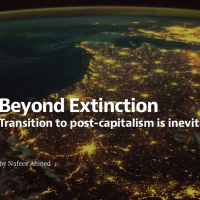Beyond Extinction: Transition to Post-Capitalism is Inevitable
Below is an article by Nafeez Ahmed discussing the transition to post-capitalism, which features my latest book, Prosperous Descent: Crisis as Opportunity in an Age of Limits. The article was originally published here.
Beyond Extinction: Transition to Post-Capitalism is Inevitable
In Margaret Atwood’s powerful essay on the reality of climate change — and its implications for the future of oil-dependent industrial civilization — she tells two vastly distinct stories of our future.
The first is a tale of dystopia — a future so bleak, it would make Hollywood moguls looking for the next science fiction blockbuster of action-packed (post)apocalypse salivate with anticipation. Here, Atwood tells a story of human failure: of short-sighted choices based on fatal addiction to business-as-usual, and an egoistic hubris rooted in centuries of globalisation.
In this scenario, we largely ignore the overwhelming evidence of climate change, and the result is that industrial civilization enters a period of protracted collapse, fuelled by accelerating war, famine, and natural disasters.
The second is a vision of utopia — a collectivist dream-world in which everybody works together, harnessing the best of human ingenuity across society, economics, politics and technology, to peacefully restructure the fundamentals of human existence. Here, Atwood tells a story of human success: of far-sighted decisions based on confronting the follies of business-as-usual, and by embracing our unity as a species.
Crossroads
Of course, both these scenarios are extremes, but there is a purpose to such extremes. Atwood uses the power of story to help us awaken to the starkness — and gravity — of the choice we now face: a choice, effectively, between hell and heaven on earth.
And Atwood is spot on when she notes that this is not just about climate change.
The meteoric accumulation of scientific data over the last few decades has increasingly brought home the fact that the climate crisis is a symptom of a deeper, civilizational problem. It is not just that we are completely and utterly dependent on fossil fuels, oil, coal and gas, to do literally anything and everything in our societies — from transport and food, to art and culture.
It is the wider context of that structural dependency: the extent to which cheap fossil fuels enabled the exponential economic growth trajectory that took-off since the Industrial Revolution; the symbiotic relationship between economic growth and the evolution of the banking system, which has been able to flood the world with credit on the back of seemingly endless supplies of cheap oil; the relentless expansion of Anglo-European capitalism through empire and slavery; the transformation and militarization of global capitalism under US dominance, accompanied by ownership and control of much of the world’s land, food, water, mineral and energy resources by a tiny minority of the world’s population; and the subjugation of planetary resources to the endless growth-imperative of that minority, as it seeks, entirely rationally within this structure, to maximize its profits.
The corresponding ecocide that has resulted — with species extinctions now at record levels, and the degradation and destruction of critical eco-systems escalating at unprecedented scales — is not factored into the narrow calculations of quarterly returns by these powerful interlocking corporate and banking conglomerates.
Climate change is merely one symptom of a wider Crisis of Civilization.
To continue reading, see here.




